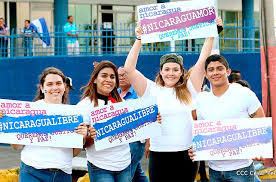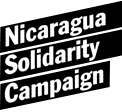NSCAG issues statement on Nicaraguan crisis
NSCAG News |
on: Monday, 4 June 2018

NSCAG has issued the following statement and briefing in response to current and ongoing developments in Nicaragua:-
This statement is in response to the tragic events that have taken place across Nicaragua over recent months. These have arisen out of widespread demonstrations both against, and in support of, the elected Sandinista Government. What started as a protest against a new social security law at the technical university in Managua has spread to other state universities and cities. The situation has escalated into violence that has resulted in the tragic deaths of over 60 people, hundreds have been injured and there has been widespread arson and opportunistic looting. There have also been politically motivated threats, attacks and the deliberate destruction of public buildings and private property.
The elected Government, led by President Daniel Ortega, quickly withdrew the controversial social security law and has now called for a National Dialogue across all sectors to support a peaceful solution to these issues. The concern now is that right wing forces, both inside and outside the country, will use these protests to force their agenda of regime change. This has been the case in many countries across the region including in Venezuela. On 24 May 2018, the United States Government made a statement that ominously threatened to take action against Nicaragua ‘if the Ortega regime fails to co-operate’.
It is important to note that the current Nicaraguan government was elected for a second term in 2016 with a vote of 72% and has delivered economic stability and growth combined with highly successful social programmes that have benefited the vast majority of Nicaraguan citizens over the past 11 years.
This statement and briefing sets out our position and provides background information. We hope that this will be disseminated widely to help clarify the situation for all those interested in supporting the Nicaraguan people at this difficult time.
Statement
The Nicaragua Solidarity Campaign Action Group (NSCAG) is calling on members, affiliates and supporters to;
• support a peaceful solution to the current crisis, including support for the National Dialogue initiated by the Nicaraguan government and mediated by the Catholic Church, involving all sectors of society - students, civil society, the private sector and the trade unions
• reject and oppose any foreign intervention in the internal affairs of Nicaragua as a violation of international law and an aggression against the principle of national sovereignty
• support the calls for an immediate cessation of violence, the lifting of road blocks, and the restoration of peace, security and stability in Nicaragua
• oppose any US sanctions and threats which will not help resolve this situation and will only exacerbate the country’s difficulties and encourage further violence
• oppose any attempts to oust the elected government of Nicaragua by undemocratic and violent means
• support the Truth and Justice Commission that has been established to investigate all the cases of violence and produce reports to administer appropriate justice to whoever is responsible from either side
• defend the right of the Nicaraguan people to defend their sovereignty and determine their own future free from any external interference and aggression
Background Briefing
In September 2016, sections of Nicaragua’s extreme right wing opposition visited Washington to meet with their US allies, including Congress member Ileana Ros-Lehtinen, a Cuban-American who has consistently used her position on the House Foreign Affairs Committee to attack the UN and promote policies to destabilise Latin America, particularly Venezuela and Cuba. The reason for the meeting was to call on the US Congress to impose sanctions on Nicaragua by means of the NICA Act, which was subsequently introduced into Congress and passed in 2017. In short, unable to win by democratic means, a section of Nicaragua’s opposition decided to resort to US aggression against their own nation as a prelude to ‘regime change’.
In November 2016, Daniel Ortega won the Nicaraguan Presidential election with 72% of the popular vote on a turnout of around 65%. He promised to defend the social and economic achievements of the FSLN Government and to continue with Nicaragua's strong economic growth. The Nicaraguan trade unions called the victory a triumph for workers around the world who are fighting for a better world. All aspects of the electoral process were monitored by a group of Latin American electoral experts including former ministers, members of parliament, presidents of electoral commissions and others with substantial knowledge and experience from other countries in the region. In their report on the elections, the group noted the clarity and distribution of election materials, the efficient functioning of polling stations and the ‘massive participation of women’ as election officials. Security forces were praised for their role in ensuring an atmosphere of order and calm devoid of conflicts. That is, the 2016 elections in Nicaragua were free and fair.
With a low popular approval rating, Nicaragua’s extreme right wing responded prior to the preliminary results of the elections, saying they would not recognise the legitimacy of the vote and calling for new elections to be held. They then falsely claimed that the Nicaraguan people had rejected the result of the Nicaraguan elections and that there was growing opposition to Daniel Ortega and his Government. At the same time, the US State Department issued a statement expressing ‘deep concern’ about the ‘flawed’ Nicaraguan electoral process. To this day, the US has not bothered to provide any evidence for its allegations. Unfortunately, as with the situation in Venezuela, Cuba and Nicaragua, the world corporate media uncritically parrots the US line without even bothering to present balanced reporting.
Attempts at regime change
In April of this year a section of Nicaragua’s right wing opposition exploited minority protests against the government’s social security reforms, fomenting violence and calling for regime change.
Over the weekend of 21 and 22 April, there was a wave of violence and wanton destruction targeting social security offices, police stations, municipal authority offices, university buildings, hospitals, ambulances, government offices, and medical supply stores of the Ministry of Health. The speed of the escalation and the simultaneous events throughout the country bore all the hallmarks of a well co-ordinated, politically motivated operation designed to undermine and discredit the government and destabilise the country.
Despite the fact that the Nicaraguan government withdrew its social security reforms as part and parcel of its effort to bring about peace and dialogue, since 22 April violent protests by armed thugs have continued, as have road blocks and sabotage, which is severely affecting the whole economy, particularly the tourist industry. Intimidation and extortion carried out by sections of the right wing opposition and their associated gangs have caused fear and tension among the population. The road blocks in particular are causing immense hardship to the population, creating food shortages and limiting free movement, which means that people are unable to go to work and many are losing their jobs. Community members attempting to dismantle road blocks have been violently attacked by protesters, who continue to burn and destroy public buildings and personal property.
The desire for peace and the national dialogue
In an effort to restore peace and stability to the country, Daniel Ortega convened a national dialogue, mediated by the Catholic Church, involving all sectors of society – students, civil society, the private sector and the trade unions. The Nicaraguan government’s stance in the dialogue is to ‘Advocate for non-violence wherever it comes from and guarantee the right to work of all people.’ Furthermore, a broad-based Truth and Justice Commission has been established whose brief is to exhaustively investigate all the cases of violence and produce reports to administer appropriate justice.
One of the main obstacles to the progress of the dialogue is the recalcitrant position of extreme right wing sections of the opposition since they do not want dialogue but want democratically elected President Daniel Ortega to resign. They along with the Trump administration seem to have settled for ‘regime change’.
Foreign intervention and threats
Since coming to power, the Trump administration has intensified interventionist policies against Venezuela, Cuba and Nicaragua. Between 2014 and 2017 over 50 grants totalling $4.2 million were given to organisations in Nicaragua by the US National Endowment for Democracy as part of a U.S. government-funded campaign to provide a coordinated strategy and media voice for opposition groups in Nicaragua. Though the language of the NED is of support for “civil society” and “pro-democracy” groups, the focus on funding is specifically to build coordinated opposition to the government.
On 7 May, in a swearing in ceremony for Carlos Trujillo, the new US ambassador to the Organisation of American States (OAS), US vice president Mike Pence stated that working for ‘freedom’ in the three countries is a priority for the Trump administration: “We will stay by the side of those who long for freedom and we will confront their oppressors.” As stated above, the US has now threatened to take action against Nicaragua ‘if the Ortega regime fails to co-operate’.
What economic impact has the escalation of violence had?
Prior to the current wave of violence, tourism in Nicaragua was booming and the economy was set to grow by 5% in 2018. According to economist Nestor Avendaño, Nicaragua’s dramatic change of image abroad is already being felt. This will mean a fall in economic growth and foreign investment and a general deceleration of the economy. Given the susceptibility of the tourist industry, there is already a high level of cancellations, particularly affecting tourist towns of Leon, Grenada, and San Juan del Sur. The losses to the country’s economy are already estimated at US$ 200 million.
What is already painfully clear is that those who will be affected most will be those who are most impoverished and living a hand to mouth existence on the margins in the barrios of the cities and in the countryside. They are the ones most affected by price rises, potential food shortages and threats to their livelihoods. This will particularly affect women.
4th June 2018





